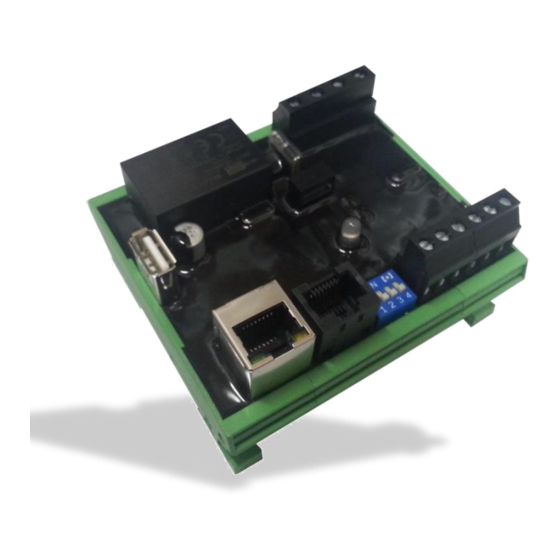
Summary of Contents for elgris ZERO Export
- Page 1 ZERO Export “Universal ZERO export controller” Manual Version 0.1 elgris GmbH Langerweher Str. 10 D-52459 Inden Germany www.elgrispower.com info@elgrispower.com...
-
Page 2: Table Of Contents
Dipswitches _________________________________________________________________________ 6 COMMISSIONING __________________________________________________________________________ 7 First time power on ___________________________________________________________________ 7 GRAPHICAL USER INTERFACE __________________________________________________________ 8 Overview ___________________________________________________________________________ 8 Inverter settings ______________________________________________________________________ 8 elgris cloud __________________________________________________________________________ 9 System settings _____________________________________________________________________ 10 www.elgrispower.com Version: 3. Januar 2018 18:49 Page 2 of 10... -
Page 3: Introduction
Introduction Dear customer, thank you for purchasing this product. The ZERO export controller is the first controller available on the market which can control up to 10 PV inverters with ZERO export. The ZERO export controller has the following features •... -
Page 4: Installation
Installation Safety instructions Before installing the product in the end-installation, ensure that the device is not damages during transport and everything looks in a normal way. All the connecting cables must not be bent or squeezed. This can result in malfunctions, short circuits and defects in the device and/or sensor connected. -
Page 5: Pin Description
Pin description Description Minimum Maximum Phase 1 voltage input 85 Vac 250 Vac Phase 2 voltage input 85 Vac 250 Vac Phase 3 voltage input 85 Vac 250 Vac Neutral input of voltage 0 Vac K input current transformer L1 0 Aac 5 Aac L input current transformer L1... -
Page 6: Rs 485 Pin Out
RS 485 pin out Description Not connected RS-232 TX RS-232 RX RS-485 B (D-) RS-485 A (D+) Not connected Not connected Dipswitches Dipswitch Description DHCP Static IP 50 Hz 60 Hz Three phase Single phase Not used must be OFF 2.7 LED status The LED on board informs the user about the internal status. -
Page 7: Commissioning
Switch of the PV inverter, disconnect the PV inverter from the system and start the controller by applying power to L1 and N in case you use a single-phase system or L1, L2 and L3 with N for three phase systems. When the ZERO export unit is working properly, the LED is blinking green. -
Page 8: Graphical User Interface
Graphical User Interface The ZERO export controller includes a webserver to adjust the system parameters and see the status of the system. By default, the webserver can be reached by typing the IP address 192.168.1.100 in a web browser. Supported web browsers are Microsoft Edge, Google Chrome and Mozilla Firefox. -
Page 9: Elgris Cloud
With the elgris cloud you can store data on the open source platform emonCMS. This enables the user to have a cloud solution where all data can be visualised and transferred on other mediums. The emonCMS software can run on the open source server, a self-hosted server or local server like Raspberry PI. -
Page 10: System Settings
System settings Status information and settings for information Basic settings like IP address and date / time Advanced settings for RS 485 bus and control parameters On the settings page the main settings and parameters can be changed. To enable the advanced settings, the checkbox must be selected www.elgrispower.com Version: 3.



Need help?
Do you have a question about the ZERO Export and is the answer not in the manual?
Questions and answers